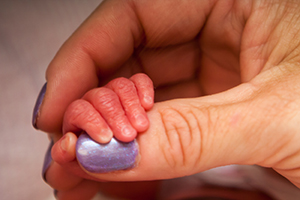
Author: Stacy Kish

Recent studies support the protective effect of magnesium supplements received by women during labor against the risk of cerebral palsy among infants born very prematurely. These results have led the American College of Obstetricians and Gynecologists to recommend magnesium supplementation for mothers facing imminent, early delivery. This positive outcome has renewed interest in determining if magnesium also offers protection against other neurological developmental conditions, like autism.
“This study suggests that the mechanism of prematurity that causes autism needs more basic science studies,” said Josh Bonkowsky, M.D., Ph.D., associate professor of Pediatric Neurology at University of Utah Health and senior author on the paper. “It opens the door to new ideas on studying this very important problem.”
Magnesium: A Protective Shield?
Bonkowsky led a research team to conduct a retrospective study that included more than 4,800 pre-term infants (24 to 37 weeks) born between 2002 and 2010 to explore the link between blood magnesium sulfate levels at birth and receiving an autism diagnosis later in life.
“A relatively high proportion of infants born with cerebral palsy go on to develop autism (approximately 7 percent),” said Amanda Bakian, Ph.D., research assistant professor in Psychiatry at U of U Health and first author on the paper. “The thought is that a newborn’s magnesium levels may provide neuroprotection against autism through several mechanisms by reducing brain injury in a manner similar to cerebral palsy.”
The researchers examined the blood magnesium sulfate levels collected from premature infants between 24 and 48 hours after delivery to see if levels of the compound conferred any protection from developing autism later in life. In addition to blood magnesium levels, the researchers controlled for other important birth related risk factors for autism in the study. Infants with genetic disorders, brain malformations, epileptic encephalopathies, congenital heart disease, meningitis, stroke, traumatic head injury, and death were excluded from the study.
The team linked the preterm infant data to the Utah Registry of Autism and Developmental Disabilities through 2014 to determine which infants were later identified with autism. Unique to the state, the registry is a joint effort of the Utah Department of Health and U of U Health Department of Psychiatry and is responsible for conducting state-wide identification of individuals who have received a diagnosis of autism under state public health code.
The relationship between a newborns’ magnesium sulfate level and risk of receiving an autism diagnosis was examined in all of the premature infants included in the study as well as separately in very preterm infants (< 32 weeks gestational age) and in infants whose mother’s received supplemental magnesium prior to birth.
Inconclusive Results Require Future Studies
According to Bakian, the study did not find any significant relationships between magnesium levels in premature infants and autism risk. Despite the inconclusive results, she is undeterred.
She cites other factors that could be confounding the results. Bakian believes if magnesium is offering protection against hypoxia (deficiency in the amount of oxygen reaching the tissues), its beneficial effects may be countered by the higher elevation of Utah. She also points to the lack of population diversity in the study.
“This is one of the few studies that looks at protective measures against autism,” she said. “We are hoping this study encourages other researchers to explore a link between magnesium sulfate and autism risk in different geographic locations among more diverse populations.”
This work was supported by the National Institutes of Health.
Bakian and Bonkowsky were joined in this study by Deborah Bilder at U of U Health and E. Kent Korgenski at Intermountain Healthcare.